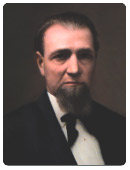Former justices

Justice Harlow S. Orton
Wisconsin Supreme Court Justice: 1878–1895Chief Justice: 1894–1895
Life: 1817–1895
"In his intercourse with the people of every class he was gentle, sympathetic, and kindly, and he was gallant and courteous in a strong degree. His radiant smiles and his ringing cheery voice were in themselves mediums of encouragement and hope to all who came within the circle of his presence." – Judge E. W. Keyes, Orton's memorial service (1895)
Harlow South Orton was born in Niagara County, New York, November 23, 1817. He was educated at the Hamilton Academy and Madison University in New York.
In 1837, Orton became a school teacher in Kentucky. Later that year, he left teaching to join his brother Myron, a lawyer in Indiana. Orton was admitted to the bar in 1838. He practiced law until 1843, when the governor of Indiana appointed him probate judge for Porter County. Four years later, Orton moved to the Wisconsin Territory and practiced law in Milwaukee.
In 1852, Orton came to Madison and served as the private secretary and legal adviser to Governor Leonard J. Farwell. He was elected to the state Assembly in 1854. In 1856, he served as defense counsel in Bashford v. Barstow in which the Wisconsin Supreme Court removed an incumbent governor from office because his election resulted from fraud.
In 1859, Orton was appointed judge for the 9th Judicial Circuit to fill the vacancy left by Luther S. Dixon, who became a Wisconsin Supreme Court justice. Orton resigned as circuit judge in 1865 and returned to private law practice. He was elected to the state Assembly in 1869 and re-elected in 1871. He ran for U.S. Congress in 1876, but was defeated by a narrow margin. Orton served as dean of the University of Wisconsin Law School from 1869 to 1874 and served one term as mayor of Madison in 1877.
In 1877, Wisconsin amended its constitution to create two more seats on the Supreme Court and Orton was elected. Orton became the chief justice when Chief Justice William Lyon retired in 1894.
Orton was on the Supreme Court until he died July 4, 1895. He and his wife Elizabeth Cheney had four children.

